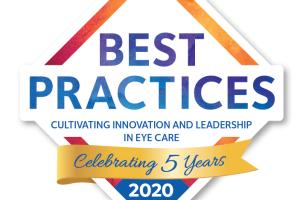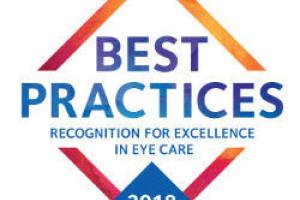
CooperVision’s 2020 Best Practices Honorees Share Passion for Giving Back
Eye care professionals make a difference every day. Changing lives is inherent in the work of giving the gift of sight. But access to eye care is still a privilege that many people in the U.S. and around the world are not afforded, and there are ample opportunities to help fill that gap.
Two of CooperVision’s 2020 Best Practices honorees—each of whom have taken very different paths to their service—are sharing their inspiration, the philanthropic programs they have built, their dreams for doing more, and why giving back is so rewarding.

Amanda Barker-Assell, OD, FAAO
Advanced Family Eye Care
Denver, N.C.

Brittani Carver-Schemper, OD
Better Vision Optometric Center
Fayetteville, N.C.
What inspires you to give so much of your time and expertise to service?
Barker-Assell: My husband and I have always been involved in mission work. In 2010, while on a vision-related mission trip, we met an 8-year-old little girl, Khaleda, who suffered from a life-threatening blood disease and due to her life circumstances, was also illiterate. We ended up adopting her to get her the care she needed. Through our experience with Khaleda, we gained a personal understanding of the power of literacy, and developed a passion for serving underprivileged populations by providing vision and literacy services. Khaleda passed away when she was 14 years old—but we wanted our daughter’s amazing story to live on through our nonprofit, BlindSight, which is now our focus.
Carver-Schemper: I have been blessed immensely and being able to give back is important to me. Our community supports our small business, which allows us to support others. I learned from a friend and through working with the local schools that many children struggle with not having adequate school supplies. I knew we could help.
Can you tell us more about the philanthropic programs you’ve developed?
Barker-Assell: BlindSight is focused on local, domestic and international projects that promote vision and literacy. In our community, we partner with schools and local organizations to provide eye care services and products along with programs that meet literacy needs. Vision is so important, but literacy is power. Internationally, we’re aiming to set up vision clinics in underserved areas. This past January, we just opened our first one in Belize. To support our mission, our main fundraiser is our annual Khaleda Run—a 5k/10k/fun run followed by a memorial butterfly release—which has been very successful at engaging the community for this cause.
Carver-Schemper: Following smaller efforts in the past, we officially established our own program last year—Good Eyes for School Supplies. For a donation of a backpack and school supplies, we’ll provide a free eye exam and glasses. We saw 55 patients for eye exams that day, but we collected 155 backpacks full of school supplies to donate to students in our community. We are looking forward to making this an annual event.
Why do you think this type of work is important in optometry?
Carver-Schemper: Giving back is important in every profession. If you have the means to serve others and your community, you should do it. Every little bit makes a difference.
Barker-Assell: Being in the medical field, there is a commitment to taking care of people; it’s our responsibility. Of course, this is our profession. But helping those in need because we have the abilities we do—it brings a whole new level of pride into the work you are doing. It’s a rewarding way to use your profession to benefit others.
What are your future plans or dreams for your program?
Barker-Assell: Ultimately, I would love to set up self-sustaining clinics in underserved areas, whether in the U.S. or internationally. It’s amazing to go in and provide short-term assistance via mission trips, but a self-sustaining clinic would really make an impact for broader populations in those communities. I am also interested in developing programs with vision vans here in the U.S. There is still so much need in our own country, so I’m looking into partnering with the Lions Club to provide screening opportunities.
Carver-Schemper: We have since moved into our new practice, which is larger and can accommodate more patients. This year, I would love to run two doctors for the exams to be able to see twice as many patients, as that would also lead to collecting more backpacks and school supplies. We are also focused on making sure we get the backpacks to where they are needed most, so we are looking into additional schools to help.How have your philanthropic programs benefitted your practice?
Carver-Schemper: When people in your community see you’re giving back; it adds a human element to your business. You’re not just there to make money; you’re helping others, too. And the people you helped—they’ll remember.
Barker-Assell: It does enable people to see that your practice is more than just a business. They want to support businesses that give back. It also increases our visibility within the community and provides a way to be involved in something meaningful themselves. Our efforts also benefit our team, giving them a higher sense of commitment to our practice because they are able to be part of something bigger.
5 Tips to Get Started Giving Back
- Identify needs. Take a step back and look at your community to determine where you can help. Meet with leaders and representatives in your community who are aware of unfulfilled needs.
- Look for a mentor. While you can certainly get by without one, finding someone who has already set up their own program to help you can be very beneficial. Pick their brain, share ideas, and be inspired by what they have accomplished.
- Start small and develop a plan. Sometimes people get overwhelmed by the idea they need to start this huge program, so they don’t end up doing anything. Remember, whether you’re helping 10 people or 100 people—you’re making a difference. Your plan doesn’t need to be elaborate; just something simple to get you started. Just take one step at a time. How can you meet the need? Then carry it out.
- Spread the word. Market what you’re doing to your patients. To get their buy-in, sometimes it’s beneficial to give them an incentive for their investment. For example, if they bring in a donation, maybe offer 10% off a pair of glasses. Or set it up that for every pair of frames sold, a portion of the profit goes to your cause.
- Join in. If you’re not yet up to spearheading your own effort, there are plenty of existing opportunities to get involved. Ask local churches about their mission trips, or explore volunteering with organizations like Optometry Giving Sight or Volunteer Optometric Services to Humanity (VOSH).
For more information about CooperVision’s best practices, its honorees (current and past), and updates on how they are working to support and advance the profession, visit www.eyecarebestpractices.com.








